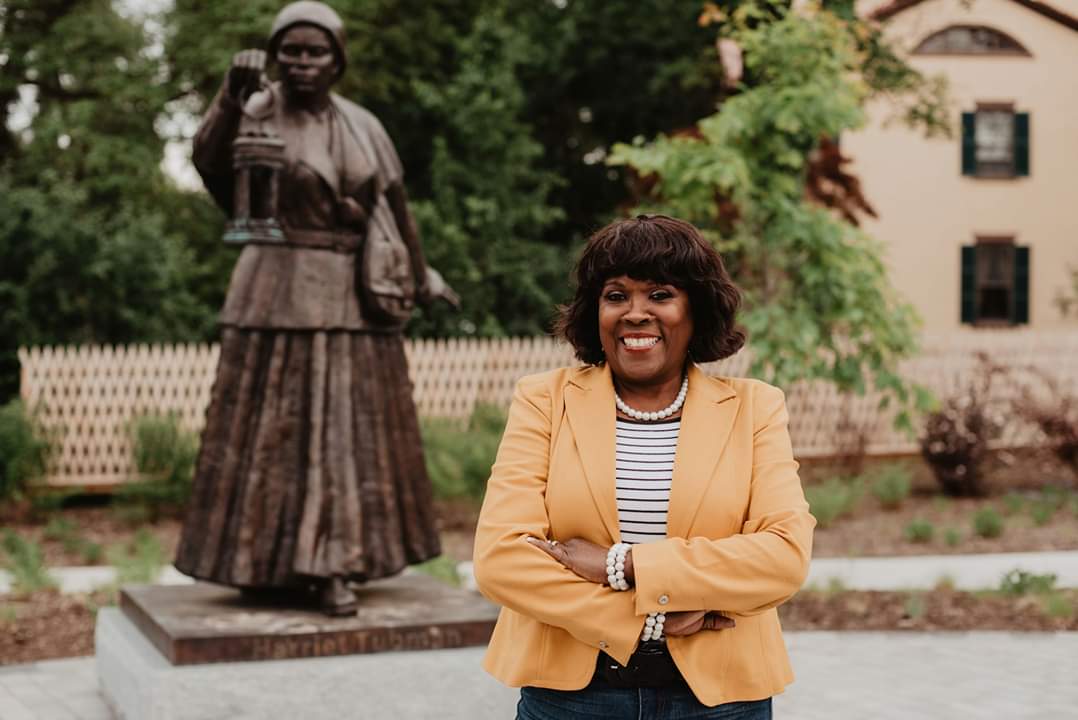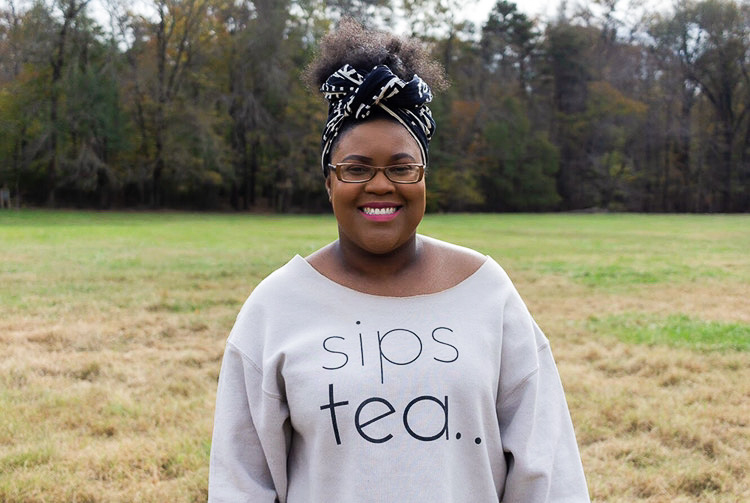Sitting in her college sociology class, Gwen Webber-McCleod had an epiphany: She wanted to run her own business, and she wanted to be her own boss. After 40 years of entrepreneurial experience and starting her own leadership brand with national influence, Gwen Inc., McCleod is keenly aware of what it means to make a social impact. She educates professionals on leadership, and she is passionate about highlighting the voices of women and marginalized communities. To signal this approach, she trademarked the term “unexpected leader.” For McCleod, this is a term of empowerment. Walking into a room where you weren’t expected to be the boss is what she’s working to change. “When I can help a minority woman figure out how to lead, she’s also changing the trajectory of generations. When you’re a Black woman entrepreneur, you are a social justice activist,” McCleod says.
At 23, McCleod held her first executive position. By the time she was 28, she was the third executive director of the National Women’s Hall of Fame. Her journey into leadership began when she was 36, and she’s traveled nationally to give lectures on the topic ever since. For McCleod, business plans never get old. She’s made them for 40 years and advises anyone who’s interested in starting a business to have that be the first item on their list. “Start working on one because it helps you sort through what you need to focus on,” McCleod says. Business plans may sound intimidating or like a heavy lift, but they don’t have to be. With effective and plentiful online resources (SCORE is a big one), making your template isn’t the most time-consuming or important part; it’s your vision.

McCleod’s experience and expertise earned her organization national recognition as a prominent resource in the leadership field. (Photo courtesy of Gwen Webber-McCleod)
Question Everything
As a social entrepreneur, you’re not just starting a business: The core of your business is to help others in some way. Your revenue has to keep you afloat, though, so balancing both the monetary and social aspect of your venture is key. Jonathan Coleman, co-CEO of ASSETS in Lancaster, Pennsylvania, an organization that supports emerging entrepreneurs, says some of the basic questions to include in your first business plan are these: What is the product or service? Why are people buying it? How are you convincing people to buy it? Does the financial model make sense? “All of those pieces are vital,” says Coleman. As it is one of the most time-consuming aspects of starting your plan, place a heavy emphasis on the impact you want to make. Knowing what you want out of your business, knowing what communities you want to serve, and understanding that there will be bumps along the way will help you move forward.
David Lucas, an entrepreneurship professor at Syracuse University, stresses the importance of recognizing that social entrepreneurs need to focus on two main facets regarding their business. “One of the most fundamental differences is that social ventures have the challenging task of creating both economic and social value through their organization,” Lucas says. “They’ve [social entrepreneurs] got sort of two sets of goalposts that they are shooting toward.” Making an impact with your business can be done in various ways, but it must remain at the core of what you do, Coleman points out. “There is, with a social enterprise, the extra component of: what is the impact model? How is that impact baked into the DNA of business?”
Adam Sternbach, an associate at McCarter & English, LLC in New Jersey, poses a similar idea. “It’s coming at both perspectives: the business side to make sure you’re building a sustainable business that can have revenues to support itself. And then, make sure that it’s having the desired impact, and you’re targeting the problem in the right way,” he says.
Begin With Community
Shanae Jones, herbalist and founder of Ivy’s Tea Co. in Silver Spring, Maryland, knew exactly what she wanted her product to be — and what she wanted it to represent. Passionate about herbalism, African holistic practices, and, of course, tea, Jones possessed a clear vision for her business. After noticing the lack of diversity in the Western tea industry, Jones decided to create a company that would embrace African culture. “Most of these [tea] companies aren’t woman-owned, they’re definitely not Black-owned,” Jones says. “It seemed really unfortunate that I would go to the grocery store, and there are a million and one teas, and none of them are made by anybody who looks like me.”
Jones wanted to make sure her company gave back to marginalized communities. She’s in the midst of changing what were Ivy Tea Co.’s “philanthropy Fridays” (every third Friday of the month the company would donate some of their revenue to various charities, such as the Black and Missing Foundation and The Black UpStart) into a scholarship opportunity that will fund the recipient to attend an herbalism school in Silver Spring.

Shanae Jones sources her organic teas from women-owned farms in the United States and South America. (Photo courtesy of Shanae Jones)
Danielle Brown, an ethnomusicologist, author, and former professor, is the founder of My People Tell Stories in Brooklyn, New York. Brown wanted to highlight people of color and their underrepresentation in ethnomusicology and music education — and encourage them to tell their own stories. Ethnomusicology looks at the music of other cultures (beyond Western) and its impact on the world. My People Tell Stories offered Brown a way to celebrate the musical culture of these communities, specifically the African Diaspora, and allowed her to share it with the public. “The entire organization, everything that we do, is designed to educate,” Brown says. The tagline for My People Tell Stories says it all: “If you’re not telling your own stories, someone else is telling them for you.”
My People Tell Stories began travel tours this past February, giving attendees an opportunity to dive deep into the culture of Havana, Cuba. “When you’re able to travel, you get to see things in a different light, beyond the marketing that travel agencies might have,” she says. “It’s all about connecting people in a truthful way.”
Use Outside Resources for Help
For Brown, learning about the world of business before she started My People Tell Stories proved helpful. “I made an effort to write a business plan. I took courses — business courses. New York City Business Solution, that was a great resource for me.” Don’t underestimate the power of a Google search, either. Uncharted, Village Capital and Small Business Development Center have also proven to be useful resources for burgeoning social entrepreneurs.
Using the internet to not only discover effective business plan templates, but as a tool for learning entrepreneurship is key, too. “Nowadays, there’s plenty of model business plans out on the web that you can grab that help you think about the stuff that you’re not thinking about,” says Chris Gardener, CEO of the Syracuse-based wealth management firm FMF&E.
Investing in good accounting software is also necessary for keeping track of your revenue, he adds. “The toughest thing when you start a business is you don’t have enough money, so anywhere you can cut corners is good,” Gardner says.
Expect Hiccups
Having a realistic view of being a social entrepreneur is key to your success. Sternbach, the associate at McCarter & English, mentions understanding that your business will fluctuate is a healthy view to have. “There’s unexpected hiccups. Things take longer than you anticipate. People aren’t always as quick and responsive and ready to either buy something, or have a conversation that you need to fulfill orders as quickly as you think,” he says. Jones recommends keeping a journal of any success to give you a boost for when things get rocky.
“You have to be willing to put in a lot of work to make any impact,” Ivy Tea Co.’s Jones says. Become dedicated to your organization — even through financial ups and downs. “That way you’re keeping track of the times you lost, and the times you won.”
You’ll experience peaks and valleys, but that doesn’t mean your business is failing. Hiccups are simply a part of being an entrepreneur. For Brown, becoming comfortable with feelings of uncertainty was a step in the right direction. “When you’re a business owner, you’re doing everything. There’s certain things you can hire out to people, but your livelihood depends on how much money you can bring in. You have to come to that point of being able to be flexible.”
Your initial business plan is everything. It’s O.K. (and recommended) to scrap your old plans and make new ones. While, yes, having a detailed and organized business plan is helpful, don’t let it determine everything you do as your business grows. Even more important than your plan is never losing sight of why you wanted to get into social entrepreneurship. “I think when you’re looking at starting an organization, or working in an organization, it’s critical if you want to do social entrepreneurship for you to be in alignment with your values,” McCleod says. So keep your values, learn everything you can, get that business plan in order — and go change the world.
Featured image courtesy of rawpixel on pxhere.com.


